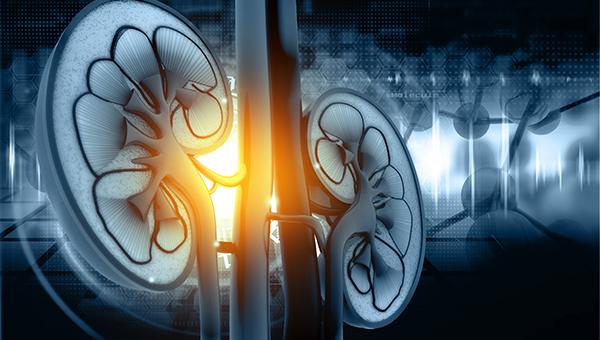Renal Denervation a Third Option for Hypertension, European Experts Say
The procedure should be considered complementary to the other two options, lifestyle changes and drugs, Costas Tsioufis says.

Evidence from trials designed and launched after release of the disappointing results of SYMPLICITY HTN-3 supports renal denervation as a third major option for the treatment of hypertension alongside lifestyle modification and drug therapy, according to a position paper from the European Society of Hypertension (ESH).
Applying lessons learned from the failure of SYMPLICITY HTN-3, including the need for more-complete ablation of the renal nerves, researchers have completed five sham-controlled trials demonstrating significant reductions in ambulatory blood pressure with denervation achieved using the Symplicity Spyral radiofrequency catheter (Medtronic) or the ultrasound-based Paradise system (ReCor Medical) in patients with or without concomitant medical therapy.
Across those studies—SPYRAL HTN-OFF MED pilot, SPYRAL HTN-OFF MED pivotal, RADIANCE-HTN SOLO, SPYRAL HTN-ON MED pilot, and RADIANCE-HTN TRIO—average systolic BP reductions ranged from 4.7 to 9.0 mm Hg on ambulatory monitoring and from 9.0 to 10.8 mm Hg in the office.
“Now we have evidence that renal denervation works definitely,” Costas Tsioufis, MD, PhD (National and Kapodistrian University of Athens, Greece), immediate past president of the ESH, and an author of the new position paper, told TCTMD, adding that the procedure is safe across a broad range of patients with hypertension.
Tsioufis was part of the task force that wrote the 2018 European hypertension guidelines, which contain a class III recommendation against use of device-based therapies (including renal denervation and others) for the routine treatment of hypertension, “unless in the context of clinical studies and RCTs, until further evidence regarding their safety and efficacy becomes available.”
Based on the handful of new trials, Tsioufis said, “we think it is time to update [our stance] and try to identify who are the potential candidates for renal denervation.” He added that the procedure “could be the third option for management of hypertension patients. We have lifestyle changes, we have effective antihypertensive medications, and now we have one effective minimally invasive interventional procedure, either with radiofrequency energy or with ultrasound, to reduce high blood pressure.”
The position statement, with lead author Roland Schmieder, MD (University Hospital Erlangen, Germany), chair of the ESH working group on interventional treatment of hypertension, was published in the September 2021 issue of the Journal of Hypertension.
Expected Cardiovascular Benefits
Though a trial of renal denervation powered for hard clinical endpoints has not been completed, it is believed that the achieved BP reductions will lead to significant cardiovascular benefits based on what has been seen in large trials of antihypertensive drugs, the ESH experts say. An outcomes trial for denervation “is a very nice wish,” Tsioufis said, but it’s not needed because “we know . . . blood pressure reduction per se is translated to a clinically meaningful reduction in hard endpoints.” Lowering office systolic BP by just 5 mm Hg, he added, is associated with lower relative risks of stroke (by 20%), ischemic heart disease (by 10%), and heart failure (by 20% to 25%).
Raymond Townsend, MD (University of Pennsylvania, Philadelphia), who did not take part in crafting the position statement, pointed out that European physicians have many more years of experience with renal denervation than US doctors. On that background, he commented to TCTMD, the paper “is optimistically written, but I think it’s defensible in the claims that it makes.”
Regarding denervation’s potential impact on cardiovascular outcomes, Townsend agreed with Tsioufis that a dedicated trial is unlikely, both because of the number of patients required and because of the difficulty of proving the impact of a specific drug or device when contemporary management of all other CV risk factors is so good. Blood pressure, he added, is only one factor involved in hypertension-mediated organ damage.
Townsend pointed out that the US Food and Drug Administration has said that a CV benefit will be obtained if blood pressure can be reduced. “And as long as you can do that reasonably safely, I think you will have de facto produced a benefit on cardiovascular outcomes,” he said.
What’s Next for Renal Denervation?
The statement authors stress that integrating renal denervation as a third major option for the treatment of hypertension “requires a structured process that ensures the appropriate performance of the endovascular . . . procedure and adequate selection of hypertensive patients. The latter should also incorporate patients’ perspective and preference that needs to be respected in a shared decision-making process.”
There are also remaining questions that need to be answered, they say, including the best ways to identify patients most likely to respond to the intervention; predictors of the completeness of denervation during the procedure; comparisons of different ablation techniques; long-term durability of the effect; and safety in patients with poor renal function.
Tsioufis said he’s sure the next iteration of the European hypertension guidelines will recommend renal denervation as an option for managing high blood pressure, underscoring that the procedure should be seen as complementary to—and not competitive with—lifestyle measures and drug therapy.
“What is important? To achieve blood pressure control,” he said. Lifestyle changes will be needed for most patients, but those are difficult to follow over time, he said, noting that poor medication adherence is an issue, too. “For these reasons, renal denervation could be part of the therapeutic strategy. Of course, you have also to take into consideration the patient’s preference.”
For Townsend, the document covers some of the major concerns physicians have had about renal denervation, including safety, efficacy, and durability. It “covers the things that are likely to be important in both clinical practice and in the clinical encounter with a patient,” he said.
In the context of poor adherence to antihypertensive medications, renal denervation has “a legitimate place at the hypertension table,” Townsend added. And with the accumulated data from the sham-controlled trials, “it would be foolish not to acknowledge that it has some place in the hypertension treatment portfolio.”
The field still awaits the results of the SPYRAL HTN-ON MED pivotal trial, which has a stated primary completion date of next month. If the study is positive, Townsend predicted, an application for approval of the technology could be submitted to the FDA within 12 to 18 months.
Todd Neale is the Associate News Editor for TCTMD and a Senior Medical Journalist. He got his start in journalism at …
Read Full BioSources
Schmieder RE, Mahfoud F, Mancia G, et al. European Society of Hypertension position paper on renal denervation 2021. J Hypertens. 2021;39:1733-1741.
Disclosures
- Schmieder reports grants and speaker or advisory honoraria from Ablative Solutions, Apontis, AstraZeneca, Bayer, Boehringer Ingelheim, Lilly, Medtronic, Merck Sharp & Dohme, Novo Nordisk, Novartis, Pfizer, ReCor, and Servier.
- Tsioufis reports research grants and honoraria for advisory boards and lectures from Medtronic, Servier, Bayer, Menarini, Novartis, AstraZeneca, Boehringer Ingelheim, Pfizer, Chiesi, Pharmanel, Sanofi, Amgen, ELPEN, and ReCor.
- Townsend reports being a consultant for Medtronic.





Comments